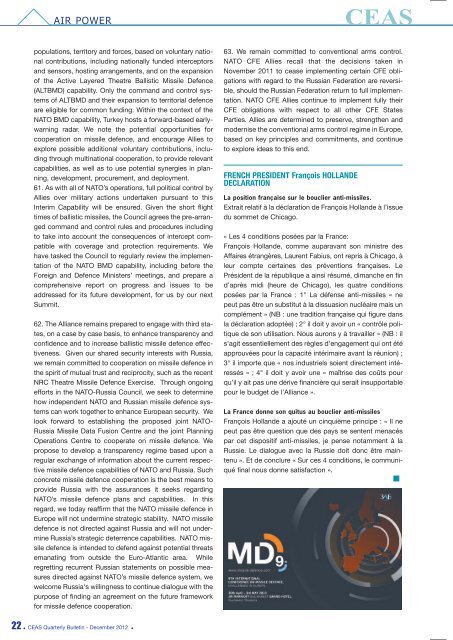Iam - CEAS. Council of European Aerospace Societies
Iam - CEAS. Council of European Aerospace Societies
Iam - CEAS. Council of European Aerospace Societies
Create successful ePaper yourself
Turn your PDF publications into a flip-book with our unique Google optimized e-Paper software.
AIR POWER<br />
populations, territory and forces, based on voluntary national<br />
contributions, including nationally funded interceptors<br />
and sensors, hosting arrangements, and on the expansion<br />
<strong>of</strong> the Active Layered Theatre Ballistic Missile Defence<br />
(ALTBMD) capability. Only the command and control systems<br />
<strong>of</strong> ALTBMD and their expansion to territorial defence<br />
are eligible for common funding. Within the context <strong>of</strong> the<br />
NATO BMD capability, Turkey hosts a forward-based earlywarning<br />
radar. We note the potential opportunities for<br />
cooperation on missile defence, and encourage Allies to<br />
explore possible additional voluntary contributions, including<br />
through multinational cooperation, to provide relevant<br />
capabilities, as well as to use potential synergies in planning,<br />
development, procurement, and deployment.<br />
61. As with all <strong>of</strong> NATO’s operations, full political control by<br />
Allies over military actions undertaken pursuant to this<br />
Interim Capability will be ensured. Given the short flight<br />
times <strong>of</strong> ballistic missiles, the <strong>Council</strong> agrees the pre-arranged<br />
command and control rules and procedures including<br />
to take into account the consequences <strong>of</strong> intercept compatible<br />
with coverage and protection requirements. We<br />
have tasked the <strong>Council</strong> to regularly review the implementation<br />
<strong>of</strong> the NATO BMD capability, including before the<br />
Foreign and Defence Ministers’ meetings, and prepare a<br />
comprehensive report on progress and issues to be<br />
addressed for its future development, for us by our next<br />
Summit.<br />
62. The Alliance remains prepared to engage with third states,<br />
on a case by case basis, to enhance transparency and<br />
confidence and to increase ballistic missile defence effectiveness.<br />
Given our shared security interests with Russia,<br />
we remain committed to cooperation on missile defence in<br />
the spirit <strong>of</strong> mutual trust and reciprocity, such as the recent<br />
NRC Theatre Missile Defence Exercise. Through ongoing<br />
efforts in the NATO-Russia <strong>Council</strong>, we seek to determine<br />
how independent NATO and Russian missile defence systems<br />
can work together to enhance <strong>European</strong> security. We<br />
look forward to establishing the proposed joint NATO-<br />
Russia Missile Data Fusion Centre and the joint Planning<br />
Operations Centre to cooperate on missile defence. We<br />
propose to develop a transparency regime based upon a<br />
regular exchange <strong>of</strong> information about the current respective<br />
missile defence capabilities <strong>of</strong> NATO and Russia. Such<br />
concrete missile defence cooperation is the best means to<br />
provide Russia with the assurances it seeks regarding<br />
NATO’s missile defence plans and capabilities. In this<br />
regard, we today reaffirm that the NATO missile defence in<br />
Europe will not undermine strategic stability. NATO missile<br />
defence is not directed against Russia and will not undermine<br />
Russia’s strategic deterrence capabilities. NATO missile<br />
defence is intended to defend against potential threats<br />
emanating from outside the Euro-Atlantic area. While<br />
regretting recurrent Russian statements on possible measures<br />
directed against NATO’s missile defence system, we<br />
welcome Russia's willingness to continue dialogue with the<br />
purpose <strong>of</strong> finding an agreement on the future framework<br />
for missile defence cooperation.<br />
22 • <strong>CEAS</strong> Quarterly Bulletin - December 2012 •<br />
63. We remain committed to conventional arms control.<br />
NATO CFE Allies recall that the decisions taken in<br />
November 2011 to cease implementing certain CFE obligations<br />
with regard to the Russian Federation are reversible,<br />
should the Russian Federation return to full implementation.<br />
NATO CFE Allies continue to implement fully their<br />
CFE obligations with respect to all other CFE States<br />
Parties. Allies are determined to preserve, strengthen and<br />
modernise the conventional arms control regime in Europe,<br />
based on key principles and commitments, and continue<br />
to explore ideas to this end.<br />
FRENCH PRESIDENT François HOLLANDE<br />
DECLARATION<br />
La position française sur le bouclier anti-missiles.<br />
Extrait relatif à la déclaration de François Hollande à l’issue<br />
du sommet de Chicago.<br />
« Les 4 conditions posées par la France:<br />
François Hollande, comme auparavant son ministre des<br />
Affaires étrangères, Laurent Fabius, ont repris à Chicago, à<br />
leur compte certaines des préventions françaises. Le<br />
Président de la république a ainsi résumé, dimanche en fin<br />
d’après midi (heure de Chicago), les quatre conditions<br />
posées par la France : 1° La défense anti-missiles « ne<br />
peut pas être un substitut à la dissuasion nucléaire mais un<br />
complément » (NB : une tradition française qui figure dans<br />
la déclaration adoptée) ; 2° il doit y avoir un « contrôle politique<br />
de son utilisation. Nous aurons y à travailler » (NB : il<br />
s’agit essentiellement des règles d’engagement qui ont été<br />
approuvées pour la capacité intérimaire avant la réunion) ;<br />
3° il importe que « nos industriels soient directement intéressés<br />
» ; 4° il doit y avoir une « maîtrise des coûts pour<br />
qu’il y ait pas une dérive financière qui serait insupportable<br />
pour le budget de l’Alliance ».<br />
La France donne son quitus au bouclier anti-missiles<br />
François Hollande a ajouté un cinquième principe : « Il ne<br />
peut pas être question que des pays se sentent menacés<br />
par cet dispositif anti-missiles, je pense notamment à la<br />
Russie. Le dialogue avec la Russie doit donc être maintenu<br />
». Et de conclure « Sur ces 4 conditions, le communiqué<br />
final nous donne satisfaction ».



